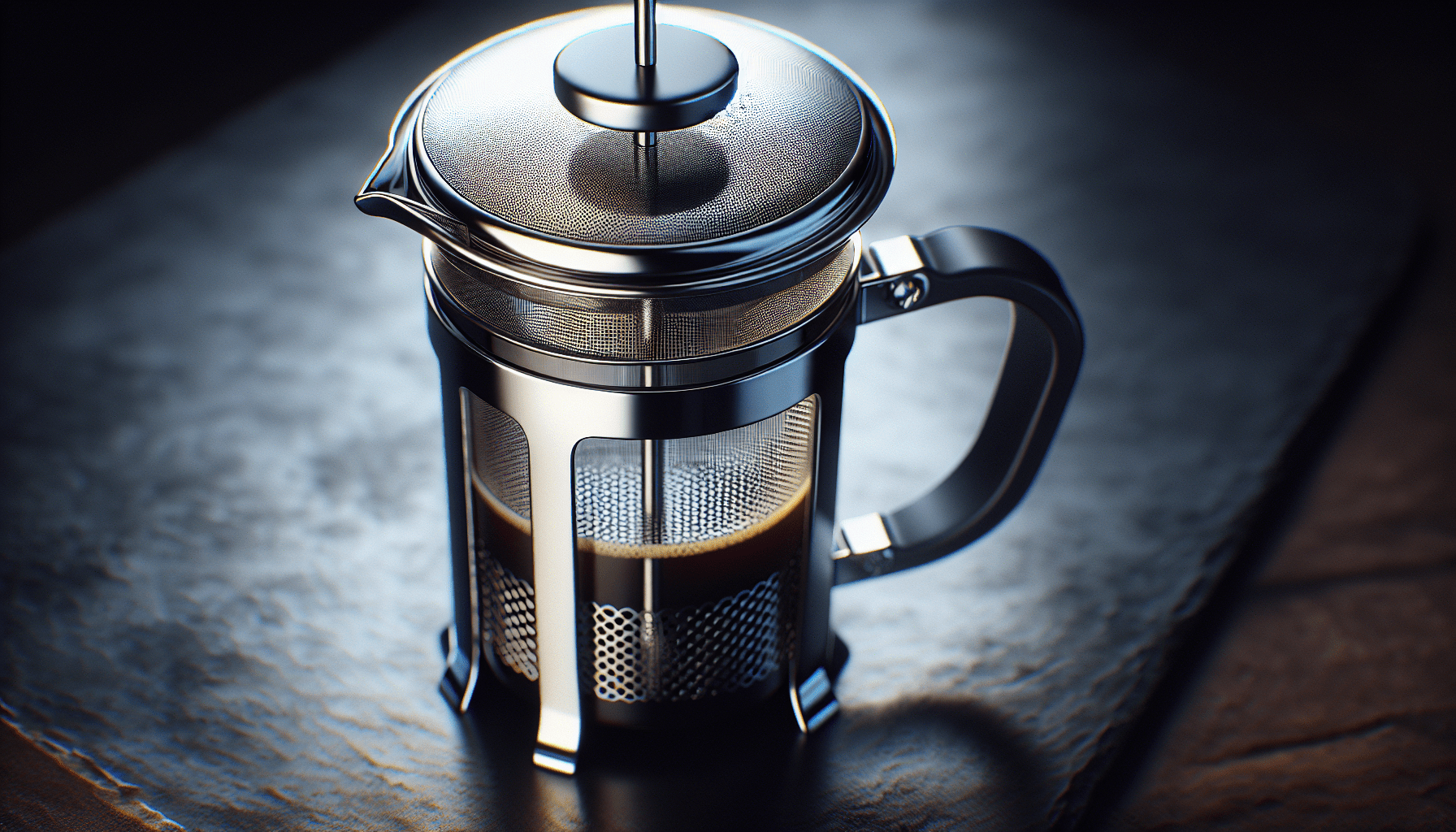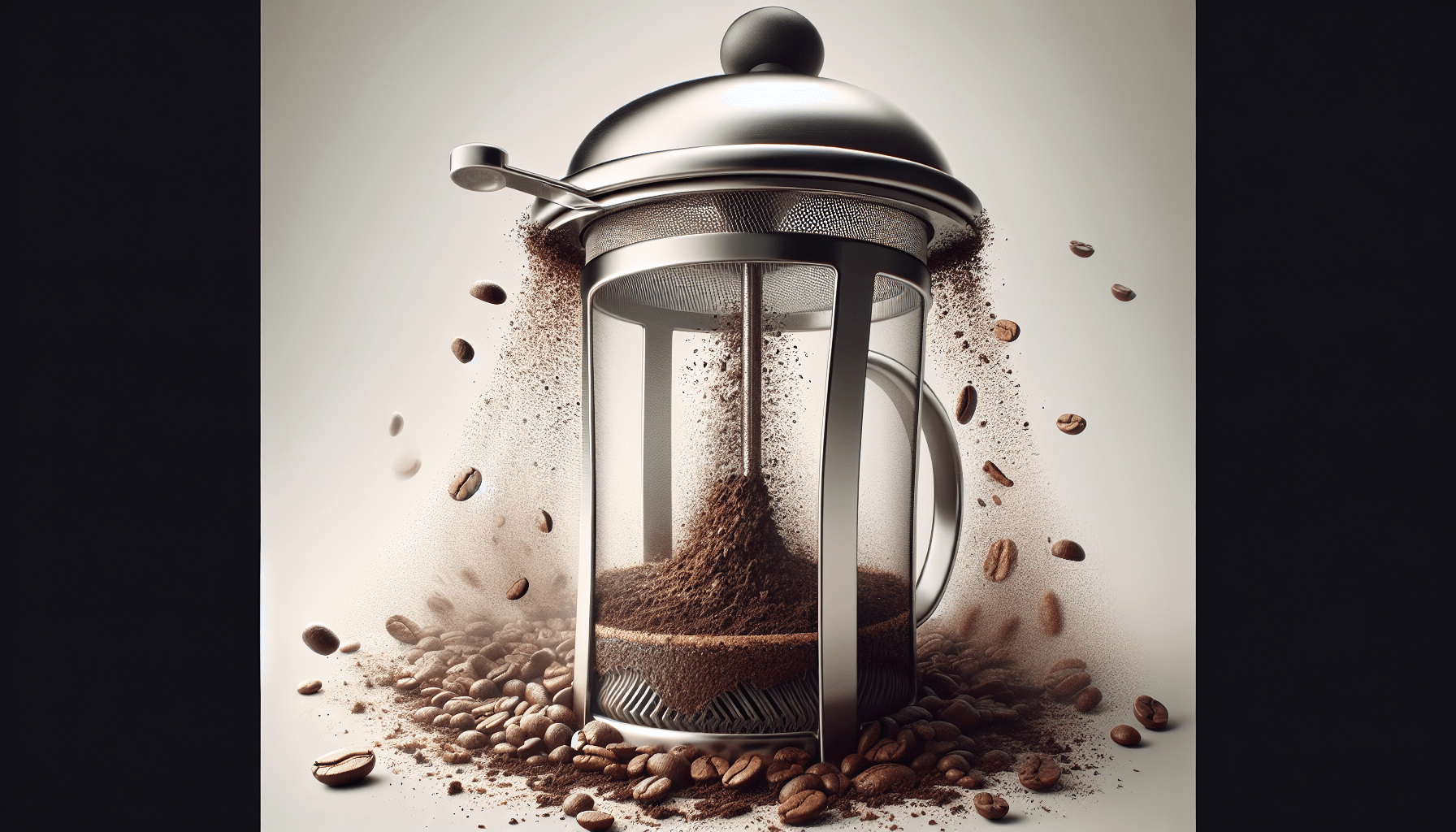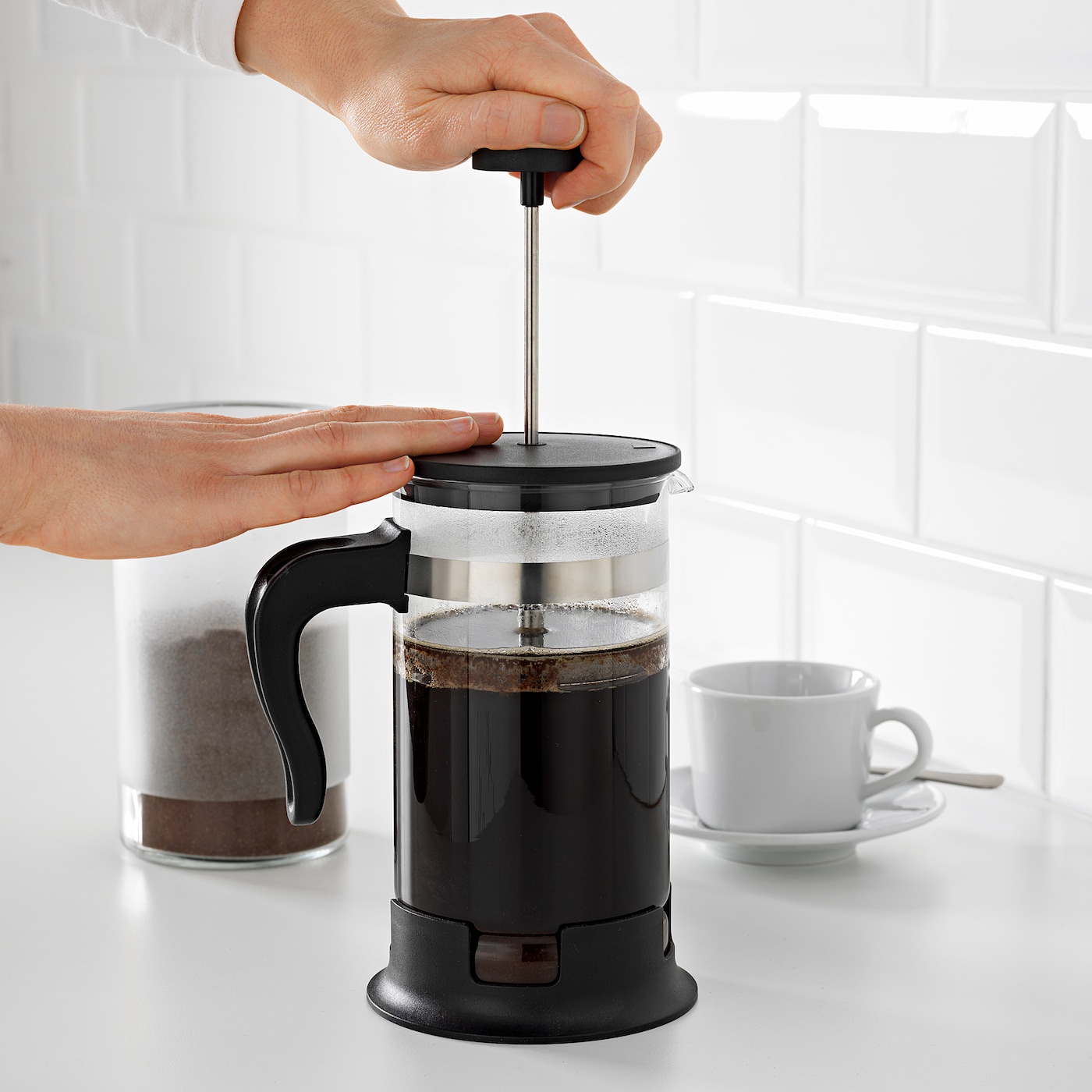Imagine waking up in the morning, the smell of freshly brewed coffee filling the air. As you groggily make your way to the kitchen, you wonder what makes a perfect cup of French press coffee. The answer lies in the grind size. Finding the ideal grind size is crucial to achieving that rich, full-bodied flavor. In this article, we will explore the different grind sizes and discover which one is best suited for your French press brewing method. So pour yourself a cup of coffee and let’s get started!
What is French Press Coffee?
Definition
French press coffee, also known as a coffee plunger or press pot, is a popular brewing method that allows you to extract maximum flavor from your coffee grounds. It consists of a cylindrical glass or stainless steel container and a plunger with a mesh filter at the end. This simple yet effective device helps to retain the coffee’s essential oils and produces a full-bodied and robust cup of coffee.
Process
The French press brewing process is relatively straightforward. First, you add coarsely ground coffee to the bottom of the press. Then, you pour hot water over the grounds and let it steep for several minutes. After steeping, you press the plunger down slowly to separate the coffee grounds from the liquid, leaving you with a rich brew ready to be enjoyed.
Popular Variations
While the standard French press brewing process remains the same, there are a few popular variations that coffee enthusiasts often experiment with. These variations can include using different ratios of coffee to water, adjusting brewing time, and even trying out different water temperatures. These variations allow for customization and experimentation to suit individual preferences.
Importance of Grind Size in French Press Coffee
Extraction Efficiency
Grind size plays a crucial role in the extraction process of French press coffee. When the coffee is ground too finely, it may lead to over-extraction, which can result in a bitter and unpleasant taste. On the other hand, grinding the coffee too coarsely may result in under-extraction, leaving behind flavors that are not fully developed. Finding the right grind size helps ensure optimal extraction efficiency, leading to a balanced and flavorful cup of coffee.
Flavor Profile
The grind size directly affects the flavor profile of French press coffee. A coarser grind generally produces a smoother and less-acidic cup, allowing the rich flavors of the coffee to shine through. In contrast, a finer grind can intensify the coffee’s acidity and bring out different flavor notes, making it ideal for those who prefer a brighter and more vibrant brew. Understanding how grind size impacts the flavor helps you tailor your coffee to your personal taste preferences.
Texture and Consistency
Grind size also influences the texture and consistency of the final cup. Coarser grinds tend to produce a thicker and more robust body, often associated with the classic French press experience. Finer grinds, on the other hand, can result in a cleaner and lighter body. Finding the right balance between texture and consistency allows you to create a cup of French press coffee that perfectly suits your desired mouthfeel.
Factors to Consider for Choosing Grind Size
Brewing Time
One crucial factor to consider when determining the grind size for French press coffee is the brewing time. Coarse grinds generally require longer steeping times to extract the desired flavors fully. Finer grinds, on the other hand, have a shorter brewing time due to the increased surface area and faster extraction. Understanding how brewing time relates to grind size helps you adjust your brewing process to achieve the desired taste and strength of your coffee.
Filters
Another consideration is the type of filter used in your French press. Traditional French presses utilize a metal mesh filter, which allows some fine particles to pass through. Therefore, a coarser grind is often recommended to avoid excessive sediment in the cup. However, some modern French press models come with additional filters or finer mesh options, which can accommodate a finer grind size without compromising the clarity of the brew. Taking into account your specific filter type can help determine the ideal grind size for your French press.
Personal Preference
Ultimately, personal preference should play a significant role in selecting the grind size for your French press coffee. Every coffee drinker has unique taste preferences, and experimenting with different grind sizes allows you to discover the flavor profiles that you enjoy the most. It is important to remember that there is no right or wrong grind size, as it depends on your personal taste and the characteristics you want to highlight in your cup of coffee.
Grind Size Categories
Coarse Grind
A coarse grind is characterized by large coffee particles that resemble kosher salt or coarse sugar. This size is typically recommended for French press brewing due to the longer steeping time required to extract the desired flavors.
Medium Coarse Grind
A medium coarse grind is slightly finer than a coarse grind, with particles similar in size to rough sand or breadcrumbs. This grind size can still be suitable for French press coffee, offering a slightly shorter brewing time and potentially producing a cleaner cup.
Medium Grind
A medium grind consists of coffee particles that are roughly the size of granulated sugar or table salt. While this grind size is more commonly associated with drip or pour-over brewing methods, it is worth experimenting with for French press coffee to achieve a different flavor profile.
Medium Fine Grind
A medium fine grind has particles resembling finer sand or caster sugar. It falls between a medium and fine grind, allowing for a shorter brewing time while still providing body and richness to the cup.
Fine Grind
A fine grind comprises coffee particles that are smaller than granulated sugar but slightly larger than powdered sugar. This grind size is not typically recommended for standard French press brewing, as it can lead to over-extraction and bitterness. However, it may work well with specific French press models equipped with fine mesh filters.
Extra Fine Grind
An extra fine grind consists of coffee particles similar in size to powdered sugar or flour. This grind size is generally not suitable for French press coffee, as it can result in clogging the filter and producing an overly bitter brew.
Recommended Grind Size for French Press Coffee
Coarse to Medium Coarse Grind
For most French press brewing methods, a coarse to medium coarse grind is recommended. This grind size ensures optimal extraction without over-extraction or excessive sediment in the cup. It allows for a longer brewing time, typically ranging from four to six minutes, resulting in a well-rounded and full-bodied coffee.
Benefits
Using a coarse to medium coarse grind offers several benefits for French press coffee. It allows the water to flow more freely, promoting an even extraction and preventing excessive bitterness. The larger coffee particles also minimize the chance of sediments passing through the filter, ensuring a cleaner and clearer cup of coffee.
Brewing Time
With a coarse to medium coarse grind size, the recommended brewing time is typically four to six minutes. This longer steeping time allows the flavors to fully develop, resulting in a rich and well-extracted cup of coffee. Adjusting the brewing time within this range enables you to fine-tune the strength of your brew to your liking.
Flavor Profile
The recommended grind size for French press coffee offers a flavor profile characterized by deep richness, boldness, and a full-bodied mouthfeel. The longer brewing time and coarser grind allow for the extraction of the coffee’s natural oils and flavors, delivering a robust cup with subtle nuances. The resulting flavor profile offers a balance between acidity and bitterness, making it a popular choice among coffee lovers.
How to Achieve the Ideal Grind Size
Grinder Options
To achieve the ideal grind size for French press coffee, investing in a quality coffee grinder is crucial. Manual or electric grinders designed specifically for coarse grinding allow you to have control over the particle size and consistency. Having a grinder at home gives you the flexibility to grind your coffee beans just before brewing, ensuring maximum freshness and flavor.
Burr Grinders vs Blade Grinders
When choosing a coffee grinder, it is recommended to opt for a burr grinder rather than a blade grinder. Burr grinders offer more precision and control over grind size, resulting in a more consistent particle size distribution. This consistency helps ensure even extraction and a more uniform flavor profile in the final cup. The more affordable blade grinders tend to produce unevenly sized particles, leading to potential over-extraction and a less balanced brew.
Achieving Consistency
Consistency is key when it comes to achieving the ideal grind size for French press coffee. By maintaining a consistent grind size, you can ensure that each coffee particle is extracted evenly, resulting in a harmonious flavor profile. Regularly calibrating your grinder and adhering to the recommended settings for French press brewing can help you achieve the desired consistency.
Alternative Grind Sizes and Experiments
Adjusting Grind Size
While a coarse to medium coarse grind is the recommended standard for French press coffee, it can be interesting to explore alternative grind sizes to experiment and create new flavor profiles. Adjusting the grind size within the medium range or even exploring finer grind sizes can yield exciting results and unique tasting experiences. However, it is essential to pay attention to the brewing parameters and adjust them accordingly to ensure balanced extraction.
Effects on Brewing Time
Changing the grind size will inevitably affect the brewing time required for French press coffee. Finer grinds tend to have shorter brew times as the increased surface area accelerates the extraction process. On the contrary, coarser grinds may require longer brew times to achieve desired flavor extraction. Experimenting with different grind sizes allows you to understand the impact on brewing time and tailor it to suit your taste preferences.
Effects on Flavor
Different grind sizes can significantly alter the flavor of your French press coffee. A coarser grind size will result in a cup with a heavier body, smoother mouthfeel, and potentially more pronounced flavor notes. On the other hand, a finer grind can intensify the coffee’s brightness, accentuating its acidity and highlighting different flavor nuances. Exploring various grind sizes provides opportunities to discover new taste profiles and customize your coffee experience.
Texture and Consistency Variations
The texture and consistency of French press coffee can also vary based on the grind size used. Coarser grinds tend to produce a thicker and more robust body, making each sip feel substantial on the palate. In contrast, finer grinds can result in a lighter and cleaner body, offering a more delicate and refined mouthfeel. By experimenting with different grind sizes, you can discover the textural variations that suit your personal preferences and coffee enjoyment.
Common Mistakes to Avoid
Using Pre-Ground Coffee
One common mistake in French press brewing is using pre-ground coffee. Pre-ground coffee, usually bought from stores, loses freshness and flavor over time since it has been exposed to air. Grinding your coffee just before brewing ensures maximum flavor and freshness. Invest in a coffee grinder to grind your beans right before brewing for the best possible cup of French press coffee.
Inconsistent Grind Size
Inconsistent grind size is another potential pitfall to avoid. Unevenly sized coffee particles can lead to uneven extraction, resulting in an imbalanced and underwhelming cup of coffee. Investing in a quality burr grinder, as mentioned earlier, helps maintain consistency in grind size, thus ensuring an even extraction and a more flavorful brew.
Using Incorrect Grind Size
Using an incorrect grind size can have a significant impact on the taste and quality of your French press coffee. Using a grind that is too fine can lead to over-extraction and a bitter taste, while a grind that is too coarse can result in under-extraction and a weak brew. Experimenting with different grind sizes and finding the one that suits your taste preferences is crucial for consistently delicious French press coffee.
Additional Tips for French Press Coffee
Water Temperature
Water temperature plays a vital role in French press coffee brewing. The recommended water temperature is between 195°F and 205°F (90°C – 96°C). Water that is too hot can scorch the coffee and result in a bitter taste, while water that is not hot enough may under-extract the flavors. Using a kettle with a built-in temperature control feature or a thermometer can help you ensure your water reaches the optimal temperature range.
Brewing Time
As mentioned earlier, the recommended brewing time for French press coffee with a coarse to medium-coarse grind is four to six minutes. However, brewing time can also vary depending on personal preference and the grind size used. Experimenting with different brewing times allows you to find the perfect balance of strength and flavors that suit your taste.
Stirring
Stirring the coffee grounds and water mixture during the brewing process can help ensure even extraction. Gently stirring after adding water promotes consistent contact between the coffee particles and the water, maximizing flavor extraction. Be cautious not to agitate the grounds too vigorously, as this can increase the chances of sediment passing through the mesh filter.
Plunging
When it is time to plunge the French press, do it slowly and steadily to separate the brewed coffee from the coffee grounds while minimizing agitation. A slow and controlled plunge helps maintain a cleaner cup and reduces the risk of over-extraction or excessive sediment. Take your time and enjoy the process of plunging the press, knowing that your efforts will be rewarded with a high-quality cup of French press coffee.
Summary
Importance of Grind Size
The grind size used in French press coffee has a significant impact on extraction efficiency, flavor profile, and texture. Finding the right grind size allows for optimal extraction, resulting in a balanced and full-bodied cup of coffee.
Recommended Grind Size
For most French press brewing methods, a coarse to medium coarse grind is recommended. This grind size ensures efficient extraction, a suitable brewing time, and a balanced flavor profile.
Experimentation and Personal Preference
While a recommended grind size exists, it should not limit your coffee exploration. Experimenting with various grind sizes and brewing parameters allows for customization and discovery of unique flavor profiles that cater to your personal taste preferences. Don’t be afraid to try new approaches and refine your French press coffee technique to create the perfect cup every time.




